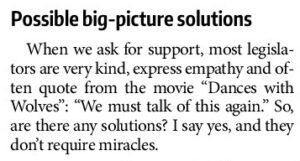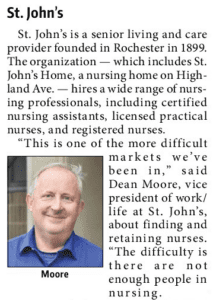St. John’s Shares Expertise with RBJ on Possible Solutions to Nursing Shortage
“We are doing everything we can think of,” said St. John’s Vice President of Work Life Dean Moore when he sat down with Rochester Business Journal‘s Caurie Putnam. Moore discussed the looming effects of the nursing shortage and the “creative” ways education plays a role in to attracting and producing nursing professionals to help with the shortage.

Putnam noted that about 800,000 registered nurses intend to leave the workforce by 2027 due to “stress, burnout, or retirement.”
“The difficulty is there are not enough people in nursing,” said Moore.
“Every nurse we gain is someone else’s loss in the local healthcare community, and vice-versa.”
St. John’s Home offers nursing home care, rehabilitation, dementia care, and assisted living, with each service relying heavily on the work of registered nurses, certified nursing assistances, clinical coordinators, and supervisors.
Moore, who is empathetic and understanding to the local healthcare community’s growing issues, shared how St. John’s has worked to combat the nursing shortage with “new and creative ways of nursing recruiting and retention.”
St. John’s has initiated salary increases and new benefits, like Payactiv, which gives employees the option of direct pay as they earn. Moore also said that St. John’s has seen success through the hiring of retired nurses for per-diem and part-time positions.
With all of the innovation at St. John’s, Moore expressed that there needs to be change outside of the organization as well. He expressed interest in efforts made by European nations.
“In Europe, a lot of countries begin training nurses in high school. High schools here could easily teach certified nursing classes,” he commented. “When you invest in healthcare, pretty much everyone is a winner.”
In a RBJ Viewpoint column, Moore went into further detail about the effectiveness of education on the shortage crisis. In his column, “How to solve the local nursing home staffing crisis,” spoke about the power in legislation and public policy. This column also appeared recently in McKnight’s Long-Term Care News.
 “One public policy action we could take is to offer free federal or state-funded education to people who are willing to pursue nursing or a related field of study,” Moore wrote. “Having more healthcare workers will benefit the country, not just those receiving the benefit.”
“One public policy action we could take is to offer free federal or state-funded education to people who are willing to pursue nursing or a related field of study,” Moore wrote. “Having more healthcare workers will benefit the country, not just those receiving the benefit.”
Read the full Rochester Business Journal article online (for subscribers only): Critical nursing shortage prompts local organizations to rethink recruiting and retention

